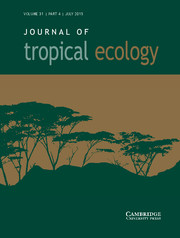Crossref Citations
This article has been cited by the following publications. This list is generated based on data provided by
Crossref.
Makhabu, Shimane W.
Skarpe, Christina
and
Hytteborn, Håkan
2006.
Elephant impact on shoot distribution on trees and on rebrowsing by smaller browsers.
Acta Oecologica,
Vol. 30,
Issue. 2,
p.
136.
Skarpe, Christina
and
Hester, Alison J.
2008.
The Ecology of Browsing and Grazing.
Vol. 195,
Issue. ,
p.
217.
Prins, Herbert H. T.
and
Fritz, Hervé
2008.
The Ecology of Browsing and Grazing.
Vol. 195,
Issue. ,
p.
179.
Chamaillé‐Jammes, Simon
Fritz, Hervé
and
Madzikanda, Hillary
2009.
Piosphere contribution to landscape heterogeneity: a case study of remote‐sensed woody cover in a high elephant density landscape.
Ecography,
Vol. 32,
Issue. 5,
p.
871.
Kohi, Edward M.
de Boer, Willem F.
Peel, Mike J. S.
Slotow, Rob
van der Waal, Cornelis
Heitkönig, Ignas M. A.
Skidmore, Andrew
and
Prins, Herbert H. T.
2011.
African Elephants Loxodonta africana Amplify Browse Heterogeneity in African Savanna.
Biotropica,
Vol. 43,
Issue. 6,
p.
711.
O’Kane, Christopher A.J.
Duffy, Kevin J.
Page, Bruce R.
and
Macdonald, David W.
2011.
Are the long-term effects of mesobrowsers on woodland dynamics substitutive or additive to those of elephants?.
Acta Oecologica,
Vol. 37,
Issue. 5,
p.
393.
Lagendijk, Georgette
Page, Bruce R.
and
Slotow, Rob
2012.
Short‐term Effects of Single Species Browsing Release by Different‐sized Herbivores on Sand Forest Vegetation Community, South Africa.
Biotropica,
Vol. 44,
Issue. 1,
p.
63.
Owen-Smith, Norman
and
Chafota, Jonas
2012.
Selective feeding by a megaherbivore, the African elephant (Loxodonta africana).
Journal of Mammalogy,
Vol. 93,
Issue. 3,
p.
698.
Codron, Jacqueline
Codron, Daryl
Sponheimer, Matt
Kirkman, Kevin
Duffy, Kevin J.
Raubenheimer, Erich J.
Mélice, Jean-Luc
Grant, Rina
Clauss, Marcus
and
Lee-Thorp, Julia A.
2012.
Stable isotope series from elephant ivory reveal lifetime histories of a true dietary generalist.
Proceedings of the Royal Society B: Biological Sciences,
Vol. 279,
Issue. 1737,
p.
2433.
O'Kane, Christopher A. J.
Duffy, Kevin J.
Page, Bruce R.
and
Macdonald, David W.
2012.
Heavy impact on seedlings by the impala suggests a central role in woodland dynamics.
Journal of Tropical Ecology,
Vol. 28,
Issue. 3,
p.
291.
Evans, Kate
and
Harris, Stephen
2012.
Sex differences in habitat use byAfrican elephants (Loxodonta africana) in theOkavangoDelta,Botswana: is size really the deciding factor?.
African Journal of Ecology,
Vol. 50,
Issue. 3,
p.
277.
O'Kane, Christopher A. J.
Duffy, Kevin J.
Page, Bruce R.
and
Macdonald, David W.
2013.
Effects of resource limitation on habitat usage by the browser guild in Hluhluwe-iMfolozi Park, South Africa.
Journal of Tropical Ecology,
Vol. 29,
Issue. 1,
p.
39.
Landman, Marietjie
Schoeman, David S.
Kerley, Graham I. H.
and
Hayward, Matt
2013.
Shift in Black Rhinoceros Diet in the Presence of Elephant: Evidence for Competition?.
PLoS ONE,
Vol. 8,
Issue. 7,
p.
e69771.
Neelo, John
Teketay, Demel
Masamba, Wellington
and
Kashe, Keotshephile
2013.
Diversity, Population Structure and Regeneration Status of Woody Species in Dry Woodlands Adjacent to <i>Molapo</i> Farms in Northern Botswana.
Open Journal of Forestry,
Vol. 03,
Issue. 04,
p.
138.
O'Kane, Christopher A. J.
Duffy, Kevin J.
Page, Bruce R.
and
Macdonald, David W.
2014.
Model highlights likely long‐term influences of mesobrowsers versus those of elephants on woodland dynamics.
African Journal of Ecology,
Vol. 52,
Issue. 2,
p.
192.
du Toit, Johan T.
Moe, Stein R.
and
Skarpe, Christina
2014.
Elephants and Savanna Woodland Ecosystems.
p.
30.
Skarpe, Christina
Bergström, Roger
Makhabu, Shimane
Rooke, Tuulikki
Hytteborn, Håkan
and
Danell, Kjell
2014.
Elephants and Savanna Woodland Ecosystems.
p.
189.
Penderis, Caryn A
and
Kirkman, Kevin P
2014.
Savanna browse production. 2: Prediction.
African Journal of Range & Forage Science,
Vol. 31,
Issue. 1,
p.
25.
Moe, Stein R.
Rutina, Lucas
Hytteborn, Håkan
and
du Toit, Johan T.
2014.
Elephants and Savanna Woodland Ecosystems.
p.
154.
Skarpe, Christina
Hytteborn, Håkan
Moe, Stein R.
and
Aarrestad, Per Arild
2014.
Elephants and Savanna Woodland Ecosystems.
p.
43.


